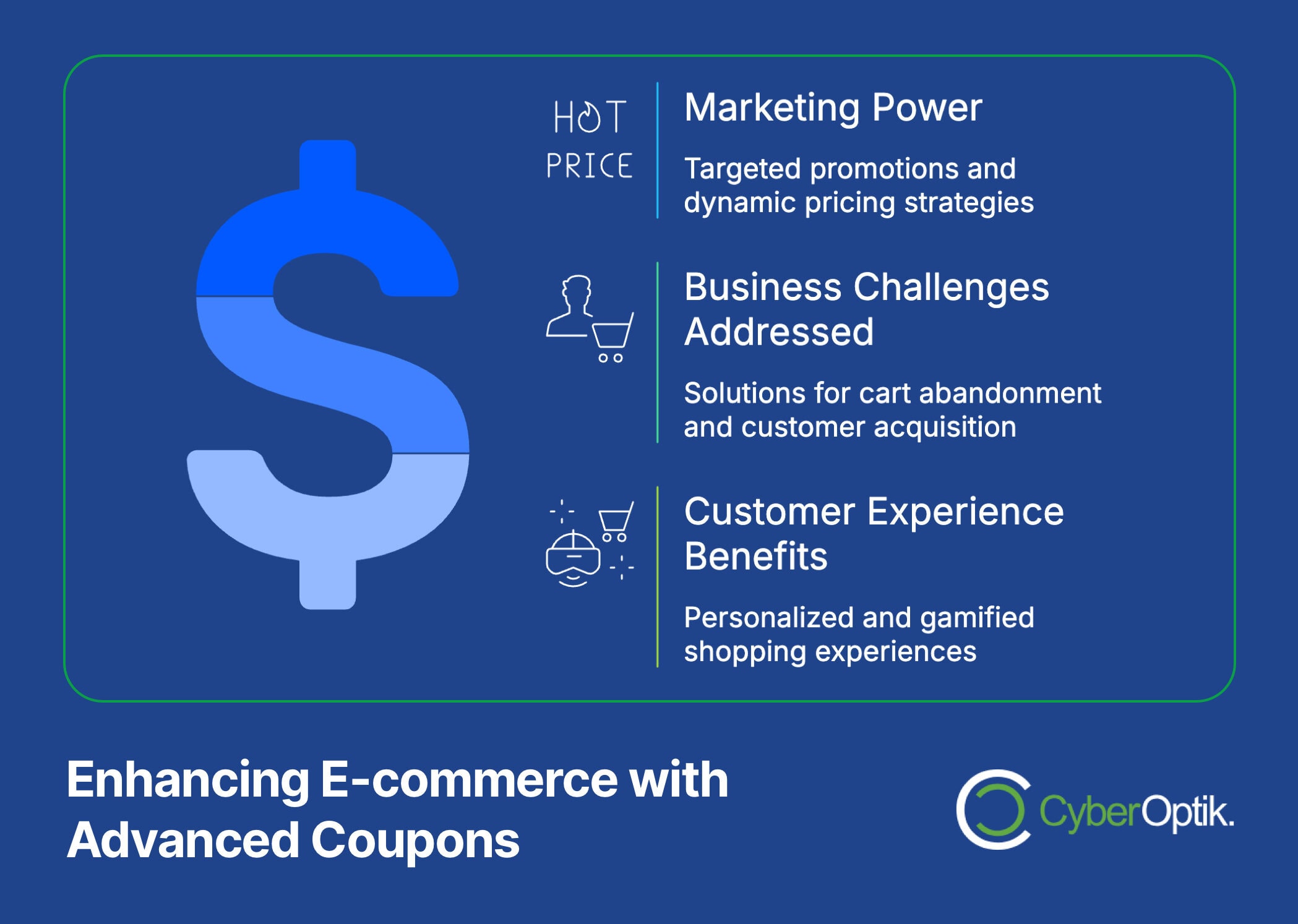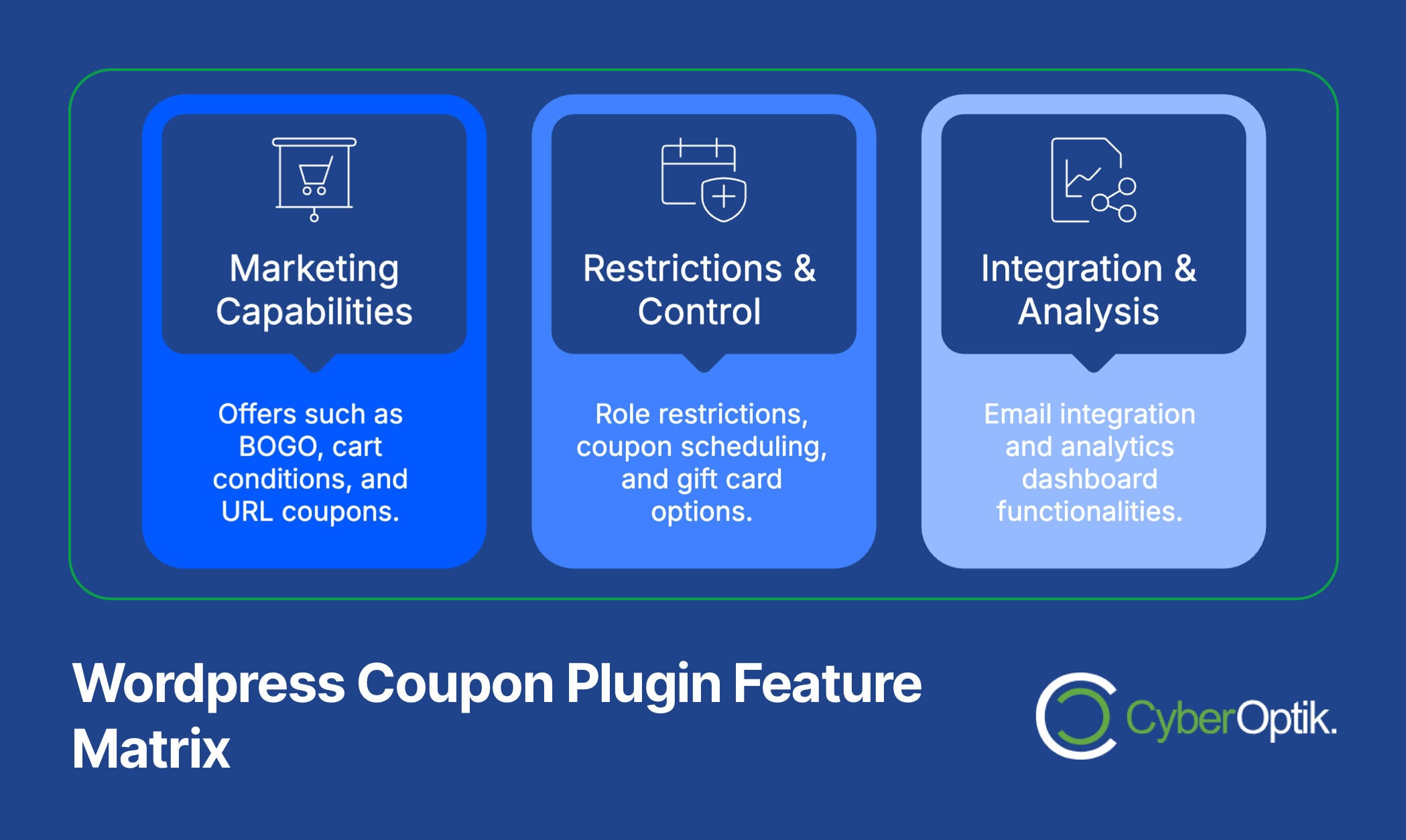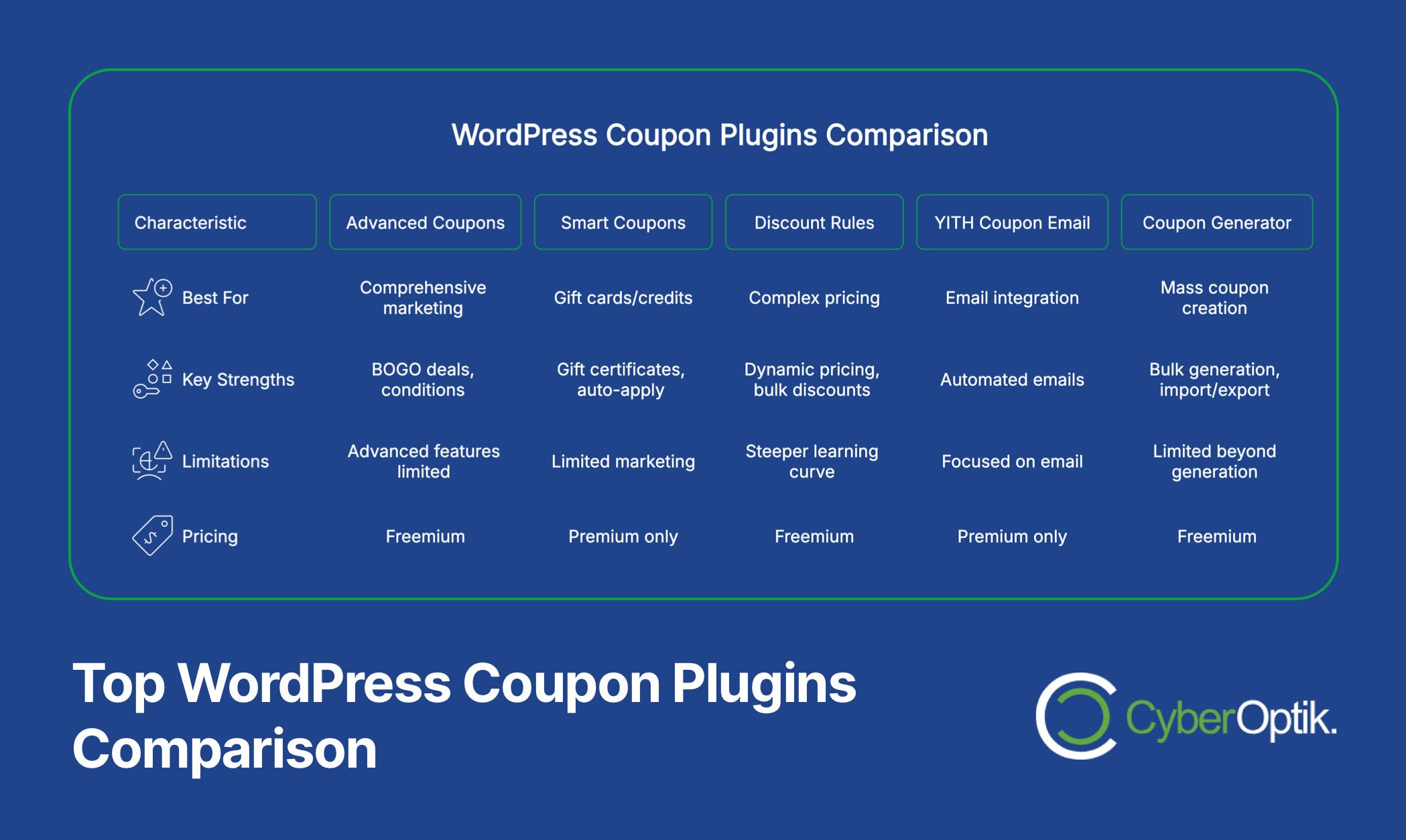Running a successful e-commerce store involves more than just listing products—it requires strategic marketing tools to drive sales and customer loyalty. Coupon plugins for WordPress are powerful assets that can significantly boost your conversion rates, reduce cart abandonment, and encourage repeat purchases. As a web design and development agency specializing in e-commerce solutions, we’ve seen firsthand how the right coupon plugin can transform an online store’s performance.
In this comprehensive guide, we’ll walk you through everything you need to know about selecting the ideal WordPress coupon plugin for your business needs, from essential features to implementation considerations.
Why Use Coupon Plugins for Your WordPress E-commerce Site

While many e-commerce platforms offer basic coupon functionality, dedicated coupon plugins provide advanced features that can take your marketing strategy to the next level. Strategic discounting isn’t just about lowering prices—it’s about creating targeted offers that drive specific customer behaviors.
Implementing the right coupon system helps overcome several common e-commerce challenges. Cart abandonment, which affects approximately 70% of online shopping carts, can be significantly reduced with well-timed discount offers. Additionally, customer acquisition costs continue to rise across industries, making retention strategies like loyalty-based coupons increasingly valuable.
WordPress coupon plugins fill the gap between basic discount capabilities and comprehensive marketing tools. They allow for greater customization, more targeting options, and better integration with your overall marketing ecosystem.
Benefits of Advanced Coupon Functionality
Advanced coupon plugins offer several advantages over basic coupon systems:
- Targeted promotions: Create discounts for specific customer segments
- Dynamic pricing rules: Implement complex discount structures based on various conditions
- Marketing integration: Connect coupon campaigns with email marketing, social media, and other channels
- Enhanced analytics: Track and optimize promotion performance
- Customer engagement tools: Gamify the shopping experience with interactive discounts
Key Features to Look for in WordPress Coupon Plugins

Not all coupon plugins are created equal. When evaluating options for your e-commerce site, consider these essential features that can make a significant difference in functionality and results.
Discount Type Variety
The most effective coupon plugins offer multiple discount types to suit various promotional strategies. Look for plugins that support:
Fixed amount discounts provide straightforward dollar-value reductions, while percentage discounts scale with order size. BOGO (buy-one-get-one) offers can be particularly effective for increasing average order value, and free shipping coupons help overcome a common obstacle to purchase completion.
Beyond these basics, advanced plugins may offer tiered discounts (spending thresholds that unlock greater savings), bundle discounts, and automatic quantity-based price reductions.
Coupon Restrictions and Targeting
Precision targeting makes your promotional strategy more effective. Quality coupon plugins should allow you to restrict coupon usage based on:
| Restriction Type | Purpose | Business Benefit |
|---|---|---|
| User roles/groups | Target specific customer segments | Reward loyalty or encourage specific user behaviors |
| Product categories | Promote specific inventory | Move slow-selling stock or highlight new products |
| Minimum spend | Set order value thresholds | Increase average order value |
| Usage limits | Control redemption frequency | Prevent coupon abuse and maintain margins |
| Time restrictions | Create urgency with limited-time offers | Drive immediate action and boost conversion rates |
These targeting capabilities allow you to create strategic promotions that drive specific business outcomes rather than simply discounting your products.
User Experience Considerations
The customer experience of discovering, applying, and redeeming coupons significantly impacts conversion rates. Look for plugins that offer:
An intuitive coupon application process removes friction from the checkout journey. Visible coupon fields make customers aware of potential savings, while automatic application (when appropriate) can surprise and delight shoppers.
The most advanced plugins also support coupon discovery features like popup offers for new visitors, exit-intent coupon displays to reduce abandonment, and personalized offers based on browsing behavior.
Marketing Integration Capabilities
Coupons are most effective when integrated into your broader marketing strategy. Quality plugins should connect with:
- Email marketing platforms: Generate unique coupons for email campaigns
- Social media: Create shareable coupon codes for social promotions
- Loyalty programs: Reward repeat customers with exclusive discounts
- Referral systems: Incentivize customer referrals with special offers
Integration with other WordPress plugins is also crucial for creating a seamless marketing ecosystem. This connectivity allows for more sophisticated promotional strategies that engage customers across multiple touchpoints.
Analytics and Reporting
Understanding coupon performance is essential for optimizing your promotional strategy. Effective coupon plugins provide detailed analytics on:
These insights help refine your discount strategy over time. When tracking analytics, it’s important to integrate with your broader website analytics. Tools like MonsterInsights, which has over 3 million active installs, can help you monitor how coupon usage affects your overall site metrics.
MonsterInsights provides real-time stats that allow you to monitor visitor behavior during promotional periods, helping you assess the immediate impact of coupon campaigns on site traffic and engagement.
| Metric | What It Tells You | Optimization Opportunity |
|---|---|---|
| Redemption rate | Percentage of issued coupons that are used | Adjust coupon value or improve coupon visibility |
| Revenue impact | Net sales effect after discount costs | Balance discount depth with volume increases |
| Average order value (AOV) change | How coupons affect typical purchase size | Refine minimum spend thresholds |
| Customer acquisition cost | Cost to acquire new customers via coupons | Compare to other acquisition channels for ROI |
| Repeat purchase rate | How coupons affect customer retention | Develop targeted loyalty discount programs |
Advanced dashboard features, similar to what’s available in MonsterInsights, allow you to view key performance indicators at a glance. The best coupon plugins display pageviews, device breakdowns, and visitor trends directly in your WordPress dashboard, eliminating the need to navigate to external analytics platforms.
Performance and Security Considerations
Adding functionality to your WordPress site always comes with performance implications. When evaluating coupon plugins, consider:
Plugins should distinguish between different types of interactions, similar to how analytics platforms like MonsterInsights differentiate between pageviews (total page loads) and visits (unique visitor sessions). This distinction helps you understand both the reach and depth of engagement with your coupon offers.
Security features should include the ability to exclude certain users from analytics tracking, similar to how MonsterInsights allows administrators to exclude their own visits from analytics data to prevent skewing results. This ensures your coupon performance data reflects actual customer behavior rather than internal testing.
Top WordPress Coupon Plugins Comparison

After evaluating numerous options, we’ve identified several WordPress coupon plugins that stand out for e-commerce sites. Each has distinct strengths and potential limitations to consider.
The following comparison can help you identify which plugin aligns best with your specific business requirements:
| Plugin Name | Best For | Key Strengths | Potential Limitations | Pricing Model |
|---|---|---|---|---|
| Advanced Coupons for WooCommerce | Comprehensive coupon marketing | BOGO deals, cart conditions, scheduling | Some advanced features only in premium | Freemium |
| WooCommerce Smart Coupons | Gift cards and store credits | Gift certificates, credit system, auto-apply | Limited marketing integrations | Premium only |
| Discount Rules for WooCommerce | Complex pricing rules | Dynamic pricing, bulk discounts, role-based pricing | Steeper learning curve | Freemium |
| YITH WooCommerce Coupon Email System | Email marketing integration | Automated coupon emails, birthday coupons | Focused on email rather than broader functions | Premium only |
| Coupon Generator for WooCommerce | Mass coupon creation | Bulk generation, import/export, prefix/suffix | Limited additional features beyond generation | Freemium |
Feature Comparison in Detail
Beyond the general overview, it’s helpful to compare specific features across these top plugins:
| Feature | Advanced Coupons | WC Smart Coupons | Discount Rules | YITH Email | Coupon Generator |
|---|---|---|---|---|---|
| BOGO Offers | ✓ | ✓ | ✓ | ✗ | ✗ |
| Cart Conditions | ✓ | ✓ | ✓ | ✗ | ✗ |
| URL Coupons | ✓ | ✓ | ✗ | ✓ | ✗ |
| Role Restrictions | ✓ | ✓ | ✓ | ✓ | ✓ |
| Gift Cards | ✗ | ✓ | ✗ | ✗ | ✗ |
| Schedule Coupons | ✓ | ✓ | ✓ | ✓ | ✓ |
| Email Integration | ✓ | ✓ | ✗ | ✓ | ✗ |
| Analytics Dashboard | ✓ | ✓ | ✗ | ✓ | ✗ |
This detailed feature matrix highlights the strengths of each plugin across important functionality categories. Consider which features align most closely with your specific business requirements when making your selection.
Plugin Implementation Considerations
Once you’ve selected a coupon plugin, proper implementation is crucial for optimal performance. Consider these important factors when setting up your coupon system:
Installation and Compatibility
Before installing any plugin, verify compatibility with your:
Always back up your site before installing new plugins. This precaution is particularly important for e-commerce sites where data loss could directly impact revenue. Use a reliable WordPress backup plugin to safeguard your site.
For optimal site performance, consider setting up a staging environment to test the coupon plugin before deploying to your live site. This approach helps identify any potential conflicts or performance issues before they affect your customers.
Configuration Best Practices
Follow these guidelines when configuring your coupon plugin:
- Start simple: Begin with basic coupon types before implementing complex rules
- Test thoroughly: Verify coupon functionality across different user scenarios
- Document settings: Keep records of all coupon configurations for future reference
- Set usage limits: Establish appropriate restrictions to prevent coupon abuse
- Create clear messaging: Ensure customers understand how to use your coupons
Proper configuration extends to your entire e-commerce site setup. Ensure your checkout process clearly shows when coupons are applied and how they affect the final price, as transparency in discount application builds customer trust.
Common Issues and Troubleshooting
Even the best plugins can encounter issues. Be prepared to address these common challenges:
| Issue | Potential Cause | Troubleshooting Steps |
|---|---|---|
| Coupons not applying | Conflicting restrictions or conditions | Review coupon settings; simplify conditions; check for conflicts with other rules |
| Plugin conflicts | Incompatibility with other installed plugins | Disable plugins one by one to identify conflict; contact plugin developers |
| Performance slowdowns | Resource-intensive coupon calculations | Optimize your WordPress site; consider caching solutions; review server resources |
| Customer confusion | Unclear coupon terms or application process | Improve coupon messaging; simplify redemption process; provide clear instructions |
| Analytics discrepancies | Tracking configuration issues | Verify tracking setup; ensure proper integration with analytics platforms |
When troubleshooting, remember that website performance and user experience should remain top priorities. If a coupon implementation significantly slows your site or creates checkout friction, reconsider your approach.
Integration with E-commerce Platforms
Coupon plugins must work seamlessly with your e-commerce platform to provide a cohesive shopping experience. WordPress offers several popular e-commerce solutions, each with different coupon integration considerations.
WooCommerce Integration
As the most popular WordPress e-commerce platform, WooCommerce has the widest range of compatible coupon plugins. When integrating with WooCommerce, consider:
WooCommerce’s native coupon system provides basic functionality, but dedicated coupon plugins extend these capabilities significantly. Most plugins in our comparison are specifically designed for WooCommerce, ensuring tight integration.
When using WooCommerce, look for plugins that enhance rather than replace the native coupon system. This approach maintains compatibility with other WooCommerce extensions while adding advanced coupon features.
Other Platform Compatibility
If you’re using alternative e-commerce platforms with WordPress, your coupon plugin options may be more limited:
| E-commerce Platform | Native Coupon Features | Compatible Plugin Options | Integration Complexity |
|---|---|---|---|
| Easy Digital Downloads | Basic discount codes | EDD-specific extensions, fewer options than WooCommerce | Medium |
| BigCommerce for WordPress | Comprehensive coupon system via BigCommerce | Limited WordPress plugin options, use BigCommerce native features | High |
| WP EasyCart | Basic coupon system | Primarily native features, limited third-party plugins | Medium |
| Ecwid | Built-in discount tools | Use Ecwid's native system, limited WordPress plugin integration | High |
For these platforms, you may need to rely more heavily on native coupon functionality rather than dedicated WordPress plugins. Always verify compatibility before purchasing premium plugin options.
Multi-Channel Considerations
If you sell across multiple channels beyond your WordPress site, coupon consistency becomes important:
Ideally, your coupon system should provide a unified discount strategy across all sales channels. Look for plugins that offer API access or integration capabilities with other platforms for consistent multi-channel promotions.
When managing a multi-channel strategy, having robust analytics becomes even more crucial. You’ll want to track which channels generate the most coupon redemptions and highest customer lifetime value to optimize your marketing approach.
Tracking Coupon Performance
Effective measurement is essential for optimizing your coupon strategy. Implement comprehensive tracking to understand the true impact of your promotions.
Essential Metrics to Monitor
Beyond basic redemption rates, track these key performance indicators:
| Metric Category | Specific Metrics | Why It Matters |
|---|---|---|
| Acquisition Metrics | New vs. returning customers, customer acquisition cost | Measures how effectively coupons attract new business |
| Engagement Metrics | Coupon page views, email open rates, click-through rates | Indicates promotional message effectiveness |
| Conversion Metrics | Redemption rate, conversion lift, cart abandonment recovery | Shows how coupons influence purchase decisions |
| Revenue Metrics | AOV impact, profit margin effect, customer lifetime value | Reveals financial impact beyond simple sales increases |
| Behavioral Metrics | Product discovery, category expansion, repeat purchase rate | Highlights how coupons shape customer behavior |
For accurate tracking, integrate your coupon plugin with your broader analytics tools. This integration provides context for coupon performance within your overall marketing strategy.
Setting Up Analytics Integration
For comprehensive tracking, connect your coupon system with analytics platforms:
For example, when setting up analytics integration, ensure your system can filter out internal traffic. Just as MonsterInsights allows administrators to exclude their own visits from analytics data to avoid skewing results, your coupon tracking should distinguish between customer usage and team testing.
Consider implementing website speed optimization techniques when adding tracking scripts. Analytics integration should not negatively impact your site’s performance, as slower load times can reduce conversion rates regardless of coupon appeal.
Optimizing Based on Data
Use performance data to refine your coupon strategy through these approaches:
- A/B testing: Compare different discount types, values, and messaging
- Segmentation: Tailor offers based on customer behavior patterns
- Timing optimization: Identify when coupon offers generate best results
- Channel effectiveness: Focus on promotional channels with highest ROI
- Iterative improvement: Regularly refine coupon campaigns based on results
Data-driven optimization helps transform your coupon program from a simple discount tool into a strategic marketing asset. By continuously analyzing performance and refining your approach, you can maximize both customer satisfaction and business results.
Conclusion and Recommendations
Selecting the right WordPress coupon plugin requires balancing your specific business needs with technical considerations. Based on our analysis, here are our recommendations for different business scenarios:
Best Plugins for Different Business Needs
For small businesses just starting with coupon marketing, Advanced Coupons for WooCommerce (free version) provides an excellent entry point with core functionality and room to grow. For established stores with comprehensive marketing programs, the premium version of Advanced Coupons or WooCommerce Smart Coupons offers the robust features needed for sophisticated campaigns.
Businesses focused on specific promotions might consider specialized options: YITH WooCommerce Coupon Email System for email marketing integration, or Discount Rules for WooCommerce for complex dynamic pricing structures.
Implementation Strategy
Whatever plugin you choose, follow these implementation steps for success:
- Define clear goals for your coupon program before implementation
- Start with a simple pilot to test functionality and customer response
- Establish measurement systems to track performance from day one
- Gradually introduce complexity as you gain experience with the system
- Regularly review and optimize based on performance data
Remember that coupon plugins are tools within your broader e-commerce marketing strategy. They should complement your product offerings, pricing strategy, and customer experience rather than compensating for weaknesses in these areas.
Long-term Considerations
As your business grows, your coupon strategy should evolve accordingly:
With the right WordPress coupon plugin and strategic implementation, you can create a discount program that drives meaningful business results while enhancing the customer experience. Take time to evaluate your options carefully, considering both current needs and future growth plans.
By integrating coupon functionality with your broader WordPress ecosystem, you’ll build a powerful marketing tool that contributes to sustainable e-commerce success.




